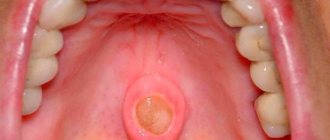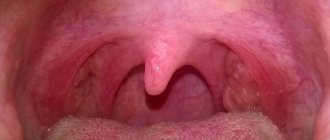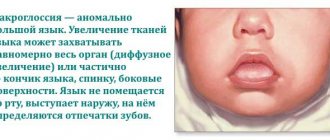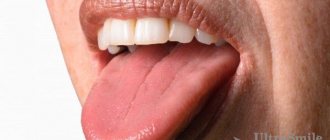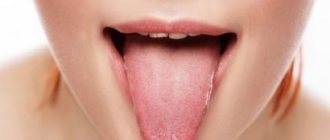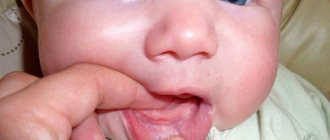The unconscious state always contains a certain danger. A person who has lost consciousness does not feel anything, his pain threshold is lowered, he does not understand what is happening to him, and is not able to help himself. Therefore, the victim needs medical attention.
An unconscious state is characterized by a serious threat of choking on vomit, blood, mucus and other masses that rush out of the digestive tract, simultaneously clogging the airways. However, more often in practice, another problem is observed, which is considered more dangerous than the movement of vomit, this is the displacement of the root of the tongue.
What it is?
Relaxation of the muscles of the lower jaw and the root muscles of the tongue while a person is unconscious will inevitably lead to the movement of the tongue from its usual position to the larynx. This phenomenon is popularly and medically called “tongue retraction.” It is characterized by a displacement of the tongue muscles towards the wall of the larynx, which leads to a cessation of air flow into the lungs, resulting in suffocation, in other words, asphyxia.
Retraction of the root of the tongue is primarily dangerous because, if the necessary assistance is not provided, the person will suffocate due to lack of air. Asphyxia that develops as a result of tongue displacement leads to a decrease in the level of oxygen in the tissues and an increase in the level of carbon dioxide in the blood. As a result, a person dies within 10 minutes from suffocation.
First aid for head injuries
Research shows that about 50% of people have had a head injury during a seizure. If there is a suspicion of a traumatic brain injury and the person is unconscious, it is necessary:
- carefully move the person to a safe place
- make sure your airways are clear
- listen to your breathing
- call an ambulance
- call the police if there is a security threat
- Apply a sterile bandage to open wounds
- cover him with a warm blanket or coat
- stay with him until the ambulance arrives
If the person is conscious, help him move to a position that he finds most comfortable. It is important to constantly check that the person is conscious and breathing normally until the ambulance arrives, and not to leave him unattended.
Causes of tongue retraction
The main reason for the development of this pathological condition is relaxation of the root of the tongue and the muscles of the lower jaw, which partly control the position of the tongue in the oral cavity. So, for example, if a victim has a broken lower jaw on both sides, then the likelihood of the tongue root being displaced is quite high.
However, in medical practice, such a cause of tongue displacement as a broken jaw is rare. Much more often, this phenomenon occurs during a long coma, during which many muscles, including the tongue, atrophy. A patient's tongue may become retracted after anesthesia is administered before surgery. Pathology is also observed in victims of accidents and other accidents, which entail severe pain shock.
Swallow tongue
Author: Dmitry Sirotkin
The phraseological phrase “swallow your tongue” is about stubborn silence .
When it seems like it’s time to say something , but no.
Next, the meaning and origin, synonyms and antonyms, as well as sentences with phraseological units from the works of writers are considered.
The meaning of phraseology
Swallow your tongue - 1. suddenly become silent, stop speaking; 2. about very tasty
Phraseologisms-synonyms: tongue stuck to the throat, keep quiet in a rag, do not open your mouth, remain silent like a fish, tongue stuck to the larynx, keep your tongue behind your teeth, take water into your mouth, bite your tongue, be silent like an Indian tomb, take water into your mouth, don’t open your mouth, play the game of silence, be silent like a partisan, keep your mouth shut, lick your fingers
Phraseologisms-antonyms: scratch the tongue, flutter the tongue, pound water in a mortar, throw words to the wind, pour from empty to empty, grind with the tongue, chatter with the tongue, loosen the tongue, talk too much, sharpen the lasses, give free rein to the tongue, ring all the bells, tell everyone you meet and cross, wash dirty linen in public, secretly to the whole world, shout at all crossroads
Foreign languages have corresponding expressions. Among them:
- swallow one's tongue (English)
- in sieben Sprachen schweigen (German)
- avaler sa langue, manger des pois chauds (French)
Origin of phraseology
At first glance, the origin of the phraseological unit “swallow your tongue” is intuitive and does not require any special explanation: the person remains stubbornly silent, without opening his mouth, as if his tongue had disappeared; where could he have gone? - swallowed. A memorable image. However, there were some variations on the theme that claim to be versions of its origin:
- Firstly, this is a pathetic version about messengers or warriors who bit off their tongues during captivity so as not to give away some military secret. It is characteristic that not a single real historical example of such behavior is given. To be honest, I generally doubt that this can be done physiologically in a conscious state. Moreover, it is obvious that one's own tongue is not the most suitable object for swallowing, and perhaps in such circumstances it would be much more convenient to spit it out rather than swallow it, and as a result the whole thing might get the name "biting one's tongue off." But adherents of this harsh version note that they had to swallow their tongue out of fear that the enemy’s sorcerers would decode this very military secret from him.
- As a variation, they give the example of eastern bodyguards, among whom the disabled - the deaf and dumb - were especially valued, and the rest liked to cut out the tongues without waiting for them to blurt out anything secret. But that’s another story, without self-swallowing...
- Other languages are also involved: some consider this expression to be a translation into Russian of a similar French expression, while others point to a certain Polish grandfather from a Polish song, who got such a delicious lunch that he swallowed his tongue. Of course, pourquoi pas, but the justifications in both cases look too lightweight.
Sentences with phraseological units
Joe was silent. Well, how can we put the entire long string of nightly adventures into a short answer? It would be necessary to list them all in order to explain the pitiful state in which he now found himself. - Did you swallow your tongue? – Mr. Bronson asked with a hint of impatience. (D. London, “Voyage on the Dazzling”) - by the way, quotes from London
- Why are you, chairman, yawning with your mouth, but you yourself are silent, like a fish? Have you swallowed your tongue or have nothing to say? You seemed to want to talk, but you just couldn’t get enough of water in your mouth... That’s it, apparently, you can’t trample on the truth! (M. Sholokhov, “Virgin Soil Upturned”) - by the way, quotes from Sholokhov
Chop couldn't understand this. He decided to swallow his tongue and remained silent until the hospital, where he suddenly began to swear and curse the lacquer wood again. (K. Paustovsky, “Colchis”) - by the way, quotes from Paustovsky
I answered in monosyllables, and she finally got angry. - Ugh, Sanya, I can’t get two words out of you! "Yes and no". “It’s like I swallowed my tongue,” she said with annoyance. (V. Kaverin, “Two Captains”)
“So you scared the poor thing to death, Lachlan?” Gilleonan asked as soon as his friend returned to the room. “I didn’t hear her calling for help - it looks like she either swallowed her tongue or even died of fear.” (D. Lindsay, “Love Me Forever”)
I already knew that Jamie wouldn't say a word. He had always been silent, but now he completely swallowed his tongue, he was so shocked by this meeting. The shadow of the giantess lay on the white wall - huge, like Lord Perth himself. (S. King, “The Wind Through the Keyhole”) - by the way, quotes from King
So, the phraseological unit “swallow the tongue” provides rich food for creating versions of its origin. Perhaps the exciting image of swallowing your own tongue is truly the most valuable thing in this phraseological unit.
Next, you can familiarize yourself with phraseological units with swallow and phraseological units with tongue, as well as with other phraseological units:
- two inches from the pot
- get caught up in history
- I don't mind
- tours on wheels
- put a spoke in wheel
- hang all the dogs
I would be grateful if you share the link to the article on social networks with your friends. Use the network buttons below .
Comments are also highly welcome!
Epilepsy as one of the reasons
There are still many myths about tongue swallowing during an epileptic seizure. Some people ignorant of medicine try to open the mouth of an epileptic during a seizure with a spoon, pens, or their own fingers, simultaneously fixing the unclenched jaws with a stick or other objects. It should be noted here that such measures not only will not help the patient, but can also break his teeth and damage the oral mucosa.
The only thing a passerby can do to help a person suffering from an epileptic seizure is to try to make the space around him as safe as possible: remove hot and sharp objects to prevent head injury, put soft clothes underneath. During an attack, a person may bite his tongue, but he will never swallow it for another reason: during an epileptic seizure, all the muscles of the body are extremely tense and hypertonic.
However, tongue retraction can actually happen, not during an attack, but after it, when the muscles, on the contrary, are in a state of hypotonicity. In this case, relaxation of the root of the tongue can cause it to move from its usual position and subsequent blockage of the larynx.
Oral injuries
Another potential complication of a seizure is oral trauma. In a 2022 survey, 106 people with epilepsy completed a questionnaire about the frequency of oral injury during seizures. The researchers found that:
- 52.4% of participants had oral injuries during seizures, most commonly affecting the lips, tongue, or cheeks
- 18% had cracked teeth
- 17% had tooth fractures
Tongue bite is a common injury associated with seizures. Do not place any object or fingers into a person's mouth during an attack. This may cause:
- jaw fracture
- broken teeth
- suffocation
Appearance of pathology
As mentioned, the main symptom and at the same time the most negative consequence of tongue displacement is choking. A person cannot breathe in air because the path to the lungs is blocked. He also cannot exhale air filled with carbon dioxide, as a result of which blood circulation in the body is disrupted. This leads to a change in the patient’s complexion; it acquires a bluish tint. The longer a person does not receive the required amount of oxygen, the further the so-called cyanosis spreads: the upper part of the chest becomes blue.
A person who has had a recessed tongue begins to sweat profusely, and the veins in his neck swell and increase in size. He begins to make reflexive involuntary movements with his arms and legs, rushing from side to side due to the inability to take a full breath. The breathing itself is hoarse, arrhythmic (due to excessive tension of the intercostal muscles and neck muscles).
Basic set of exercises for the tongue
- Pull your tongue down and forward to its maximum length. If you feel tension in the muscle fibers in the root area, then the movement is done correctly. Stay in this position for a couple of seconds. At the same time, you can pronounce drawn out, as if in a chant, “and-and-and.” At least 30 approaches. This will make the muscle fibers stronger.
- Using your tongue, press on the palate until you feel slightly tired.
- If you stretch your tongue far forward and move it vigorously to the sides, then over time the muscle corset will become toned, and snoring will disappear from the patient.
- Close your mouth tightly and inhale and exhale through your nose. At this time, tighten your tongue and point it towards your throat. The approximate number of approaches is 15. Regular exercise will definitely give a long lasting effect.
- Tilt your head up a little and try to touch the uvula with your tongue.
How can I help?
First of all, the person whose tongue has shifted needs to be placed in a horizontal position. After performing this manipulation, it is necessary to tilt his head back: the left hand is placed on the victim’s forehead, and the right hand at this time raises the neck, and a retainer (pillow, bolster) is placed under it. After throwing back the head, you need to extend his lower jaw. To do this, its right and left corners are taken with both hands, shifted down and then raised forward. If breathing is restored, the person should be turned on his side to prevent relapse.
If these measures do not help to restore the patency of the airways when the tongue is retracted, then you need to move on to a proven and guaranteed method of ending the state of suffocation by getting rid of the causative factor. In this case, this is removing the tongue from the oral cavity and fixing it outside. Manipulation involves pulling the tongue out of the mouth using cloth-wrapped fingers, tweezers, forceps and, in fact, any instrument capable of capturing and holding the tongue. The next step is to secure it at the chin with an adhesive plaster or bandage.
If the displacement of the root of the tongue occurs due to a fracture of the lower jaw, then assistance should immediately begin with removing it from the mouth and subsequent fixation at the chin. Subsequent manipulations, such as matching and connecting fragments of a broken jaw, can only be provided in a specialized institution. Also, in ambulances called, doctors can provide professional assistance with tongue retraction, as they have devices for artificial ventilation of the lungs. A special air duct is placed between the root of the tongue and the wall of the pharynx, providing the lungs with air flow.
Why does it occur
Stomatitis on the tongue is caused by bacteria, viruses, and fungi that live in the oral cavity. These can be pathogenic and conditionally pathogenic microorganisms that begin to actively multiply as a result of decreased immunity or jaw injuries.
Any person has a huge number of bacteria on the mucous membranes of the tongue. Under normal conditions, they do not cause harm and do not cause any complications. This is due to the fact that saliva contains a special antiseptic component - lysozyme, which does not allow bacteria to actively spread.
With a decrease in the body's defenses and trauma to the tissues of the tongue, infection occurs. Lysozyme ceases to cope with the function of suppressing bacterial and viral agents. Then wounds appear that do not heal for a long time.
Infectious lesions of the mucous membranes
The human tongue is an ideal place for bacteria and viruses to multiply. But saliva exhibits harmful activity and does not allow the latter to spread. If the salivary glands do not function at full capacity, the content of harmful organisms increases. This happens with diabetes, dysbiosis, and severe dehydration.
If there are too many bacteria, a white or yellowish coating forms on the tongue. Soon, ulcers of an infectious nature form. Bubbles can also form, which burst and merge with each other, turning into voluminous painful erosions.
Injuries as a provocateur of illness
In some people, stomatitis is a consequence of constant trauma to the membranes of the mouth from the braces. Damage can also be a consequence of an incorrect bite - for example, if, due to an anomaly, a person very often bites the tip of his tongue.
It has been noticed that the disease more often develops in people who eat solid foods that have sharp edges (lollipops, crackers, etc.). Injury to mucous membranes and broken crowns of teeth.
Poor oral hygiene is a contributing factor to the problem.
More often, people who do not pay due attention to oral hygiene need treatment. Typically, they rarely brush their teeth, do not undergo routine dental examinations, and do not use dental floss or mouthwash.
It is very bad if a person eats unwashed vegetables and fruits or has the bad habit of biting nails and foreign objects. All this aggravates the already imperfect hygiene and increases the risk of infection of microcracks on the surface of the tongue.
Diseases of the gastrointestinal tract are the culprits of stomatitis
You can tell a lot about the features of the gastrointestinal tract by looking at the language. If the mucous membrane of an organ often becomes inflamed and becomes painful, doctors suspect the presence of ulcers, gastritis, colitis, etc.
In such a situation, self-medication is prohibited. The patient needs to consult both a dentist and a gastroenterologist.
Stomatitis as a symptom of helminthic infestation
The studies carried out made it possible to establish that tissue irritation is sometimes the result of the activity of worms living in the human body. The presence of worms can be suspected if the tissues of the oral cavity are covered with small ulcers at intervals of thirty to forty days.
Allergy is the cause of the disease
In allergy sufferers, inflammatory mouth disease is more common. Relapses occur after using certain foods, cosmetics, medications, toothpastes and various hygiene products.
If there is an assumption that the disease is a consequence of individual intolerance to any compound, the use of any formulations containing it should be excluded. During periods of exacerbation, it is necessary not only to relieve inflammation that appears in the mouth, but also to take antihistamine tablets prescribed by an allergist.
Intoxication causes illness
In some people, the disease appears in response to poisoning by some toxic elements. Sometimes one dose of a poisonous drug is enough to then suffer from relapses for a long time.
Intoxication occurs when inhaling fumes of paint, varnish, low-quality household chemicals, or after using a number of building materials. People who work with chemical fertilizers, dangerous cleaning solutions and gels are especially at risk of encountering it.
What not to do
All manipulations regarding moving the victim in space and changing the position of his head and neck are contraindicated if the person is suspected of having a cervical fracture. Any careless movement towards the victim can harm him even more. In this case, changing the position of the jaw forward and down will suffice.
It is also worth noting that some citizens have a myth firmly entrenched in their heads that it is necessary to remove the tongue and pin it with a pin or needle to the victim’s collar or cheek. Doing this is absolutely contraindicated and pointless. Moreover, first aid for tongue retraction should not be provided by such barbaric methods. To fix the tongue, a regular adhesive plaster attached to the chin will do. Moreover, fixation itself is necessary in extreme cases; changing the position of the head and neck is usually enough.
First aid for seizures
Before a seizure
If a person is showing signs of a seizure, the following steps can be taken:
- carefully take him to a safe place
- if a person is indoors, remove all furniture and other objects that are near him, paying special attention to creating space around his head
- make sure that electrical equipment or kitchen appliances are not turned on and could not cause harm
- gently lower the person to the floor if they are not already on the ground
- start timing the seizure from the moment it starts
During a seizure
If a person has already had a seizure, they should:
- carefully lower it to the ground
- take off his glasses if he wears them
- remove or loosen tight clothing, especially items around the neck or head
- place something under your head, such as a folded sweater, or use your arms to restrain your head to prevent head injury
- cover with a blanket or jacket
- Stay with the person during the seizure, talking to them in a calm, soothing manner until they come to their senses.
Do not try to restrain the person, perform artificial respiration, or offer anything to eat or drink during a seizure. If the attack lasts more than 5 minutes, seek medical help.
After a seizure
If the person is unconscious:
- Turn your head to the side to keep your airway open.
- Check your breathing.
- Until he comes to, keep him covered with a blanket and check his reaction every few minutes.
If a person comes to his senses:
- Remember that the person will likely feel tired and disoriented.
- Ask the person his name and where he is.
- Calm the person down and explain that they were having a seizure.
- Stay with them until he finally comes to his senses and help him sit in a safe, comfortable place.
- Check for any injuries that the person may have sustained during the seizure and provide first aid.
- Make sure there is someone to walk him home or take a taxi.
Prevention of tongue root displacement
When a person loses consciousness, the muscles of his body relax, including the tongue, which can fall to the back of the larynx, causing an attack of suffocation. This does not happen so often with ordinary fainting, but a number of measures should still be taken, the purpose of which is to prevent tongue retraction. Its main principle is to tilt the victim’s head back by raising the neck and placing a cushion under it. You can also secure the tongue with an adhesive tape or bandage passing through the bottom of the lower jaw and securing it around the forehead. If the jaw is broken, then you need to act differently: you need to put the person on his stomach, face down.
Conclusion
Tongue retraction is a rather dangerous phenomenon, which consists in displacement of its root and clogging of the airways. A similar condition occurs when the muscles of the body, including the tongue, relax during unconsciousness, coma and anesthesia, as well as during fractures of the lower jaw.
When the tongue moves, the person begins to choke, the veins in his neck swell, his breathing becomes hoarse, and his face gradually turns blue. You can help a person by tilting his head back and changing the position of his jaw. It also helps to fix the tongue outside the mouth by attaching it to the chin, but in no case with pins or needles.
